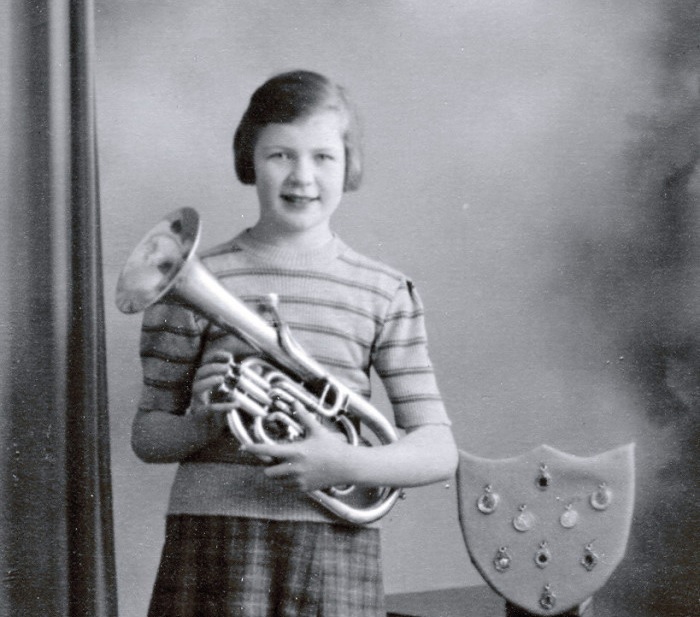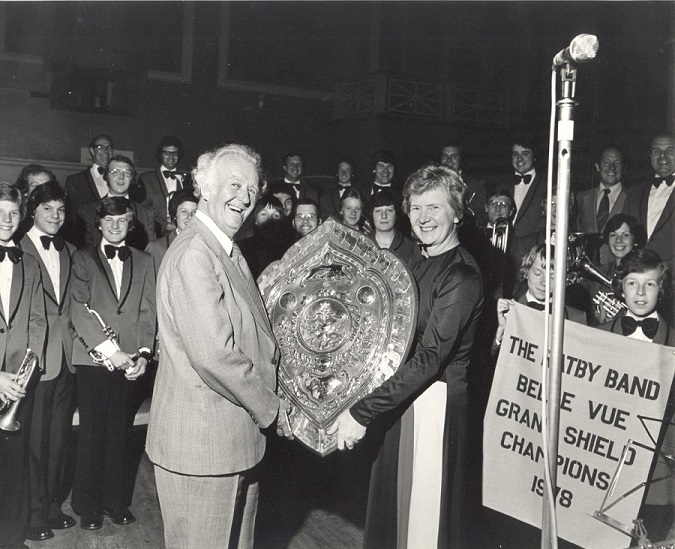
Brass band historian Tim Mutum has been asked by 4BR to curate a ‘Hall of Fame’ of players, conductors, composers, adjudicators, entrepreneurs, administrators and personalities who have helped to shape as well as drive the brass band movement from its beginning to the modern day.
Fame can be lasting and indelible or fleeting and ephemeral – from the names who appear on contest record rolls of honour to those who made contributions to greatness in other ways around the brass band globe.
Fame can be lasting and indelible or fleeting and ephemeral – from the names who appear on contest record rolls of honour to those who made contributions to greatness in other ways around the brass band globe.
The undisputed giants of Gladney, Rimmer and Mortimer will of course be included, but so too those who may not so readily be spoken of as ‘greats’ but whose contribution should without doubt be marked.
We hope you enjoy the series, which we also hope will be added to with further information about each person as we develop it.
No 11: Betty Anderson (1929 - 2018)
The brass band record books will forever include an entry that will recognise Betty Anderson as the first woman to conduct at the British Open Championships.
However, in isolation that 1978 landmark represents an exceptionally limited appreciation of a fine musician who’s pioneering spirit encompassed much more than contesting success.
Proud
Betty Anderson was born in 1929 in Leicester – one of four children in a close and secure family. Her eldest brother was a talented trombone player whose early death aged 19 left a marked effect.
Her other siblings had no enthusiasm for music, yet remained proud of her achievements as she determinedly followed in the footsteps of her father Jim (and grandfather), a respected horn player with the Leicester Imperial Band.
She quickly made a mark as performer - one of only four female players who entered the 1938 All England Solo Championships. She later claimed the tenor horn title in 1947, as well as presenting an award in her father’s honour, which she proudly won in 1964.

Although female players still faced ingrained discrimination, her determination and talent was noted.
In 1944 she was featured in a radio broadcast devised by Harry Mortimer, for younger musicians. She also went on to play solos accompanied by Black Dyke Mills and Foden’s, although the doors to becoming a member of the country’s elite ensembles remained rigidly closed.
Musical hero
Mortimer was to become a musical hero. In return, he became a close family friend for the rest of his life.
Betty later remarked that it was one of her proudest moments when ‘HM’ as she referred to him, made a special visit to ceremonially present the Ratby Band with the 1978 Grand Shield – the victory that led to that historic 1978 Belle Vue appearance.
Betty later remarked that it was one of her proudest moments when ‘HM’ as she referred to him, made a special visit to ceremonially present the Ratby Band with the 1978 Grand Shield – the victory that led to that historic 1978 Belle Vue appearance.
That success was perhaps the apex of her competitive brass banding career - one that started with Leicester Imperial (once again following in her father’s footsteps) as a player and bandmaster, and was to later flourish with the baton with Ratby Band.

Fascinating
When playing with Kibworth Band for over a decade she was also influenced by the mercurial brilliance of Walter Hargreaves, who came to help prepare them for major competitions.
She later remarked that she found his ‘banding psychology’ fascinating – one that inspired players to believe in their collective abilities and led Kibworth to enjoy promotions to the Championship Section and five consecutive Albert Hall appearances.
In 1972 she herself took the baton at Ratby, leading the band with assured, understated direction and an eye for producing and promoting youth talent from their junior band (which she formed in 1973), from the Third Section to the cusp of the Championship and that Grand Shield victory in just six years.
It was a remarkable achievement.

Banding history
In September 1978 she took to the stage at the King’s Hall at Belle Vue Manchester to create that small part of British Open and worldwide banding history.
She later recalled that before she brought the baton down on ‘Benvenuto Cellini’ she allowed herself a glance at her back row cornet section.
All were products of the Ratby Junior Band – not one of them more than 14 years of age. Her pride in them (there were 13 in total in the band) banished any personal nerves she had.
A little while later, and on the cusp of her 50th birthday, Betty Anderson took the decision to stop working at the successful family business to devote more time to her musical career.
All were products of the Ratby Junior Band – not one of them more than 14 years of age. Her pride in them (there were 13 in total in the band) banished any personal nerves she had.
Fulfilling
The next two decades and more were to become perhaps the most fulfilling of her musical life.
She soon became one of the most sought after teachers in the banding movement; her reputation enhanced by a warm, encouraging personality and her intuitive knack of understanding the personal ambitions as well as frustrations and anxieties of her charges.
She soon became one of the most sought after teachers in the banding movement; her reputation enhanced by a warm, encouraging personality and her intuitive knack of understanding the personal ambitions as well as frustrations and anxieties of her charges.
Although she never had children herself, it led her to become something of a cherished ‘aunty’ to successive generations of players lucky enough to come under her maternal and generous musical wing.
Over the years numerous young players were able to attend courses thanks to an ‘anonymous’ financial donation made by her to support their talent.

Affection
The musical respect she was held in was only surpassed by the personal affection that she elicited in everyone she was connected with.
In 1982 she retired from conducting Ratby, although she continued to take to the stage on a freelance basis until 1995, whilst her adjudicating career should undoubtedly have encompassed more than just the one appearance in the box at the National Finals (Fourth Section) in 1994.
That though mattered little in her personal ambition, as she found greater pleasure and satisfaction in other areas of her musical life - notably as the Chairperson of the National Youth Brass Band of Great Britain from 1974 to 1994. She later became a Vice-President and trustee.
That though mattered little in her personal ambition, as she found greater pleasure and satisfaction in other areas of her musical life - notably as the Chairperson of the National Youth Brass Band of Great Britain from 1974 to 1994.
In 2002 she was honoured with the award of the Mortimer Medal at the British Open Championships, although it was later presented to her by the Master of the Worshipful Company in London. It specifically marked her passion and dedication to the “teaching and encouragement of young players”.
Dedicated service
In 2013 Betty Anderson received the Dedicated Service Award from the National Association of Brass Band Conductors.
She also served the Leicestershire Brass Band Association as its President for over 20 years, for 25 as the Patron of the Hathern Band, and made a wonderful appearance in conducting the Boobs & Brass Band at the their inaugural concert in 2007. Her competitive instincts remained though as a keen bowls player.
On her death in January 2018, Lesley Bentley, the Secretary of the Leicestershire Brass Band Association told 4BR: "Betty was a true pioneer — a wonderful musician and person. Her lasting legacy is the fine condition of brass banding in the East Midlands."
Looking back on her life, it is obvious it encompassed much, much more than that.
Tim Mutum
4BR Hall of Fame: No.1: Jack Atherton
https://www.4barsrest.com/articles/2019/1832.asp
4BR Hall of Fame: No.2: Albert Baile
https://www.4barsrest.com/articles/2019/1836.asp
4BR Hall of Fame: No.3: Stanley Boddington
https://www.4barsrest.com/articles/2019/1842.asp
4BR Hall of Fame: No.4: Bram Gay
https://www.4barsrest.com/articles/2020/1848.asp
4BR Hall of Fame: No.5: Leonard Lamb
https://www.4barsrest.com/articles/2020/1855.asp
4BR Hall of Fame: No.6: Arthur Stender
https://www.4barsrest.com/articles/2020/1866.asp
4BR Hall of Fame: No.7: Violet Brand
https://www.4barsrest.com/articles/2020/1871.asp
4BR Hall of Fame: No.8: Eric Bravington
https://www.4barsrest.com/articles/2020/1875.asp
4BR Hall of Fame: No.9: Norman Ashcroft
https://www.4barsrest.com/articles/2020/1879.asp
4BR Hall of Fame: No.10: Albert Chappell
https://www.4barsrest.com/articles/2020/1884.asp














